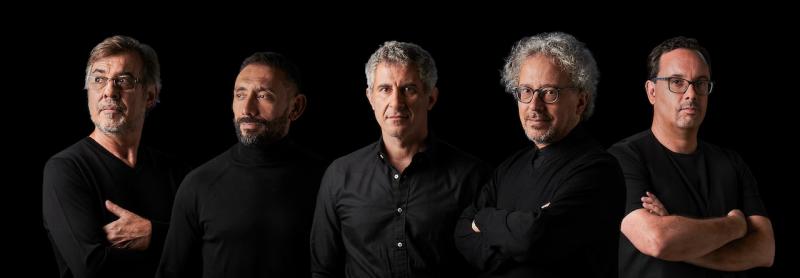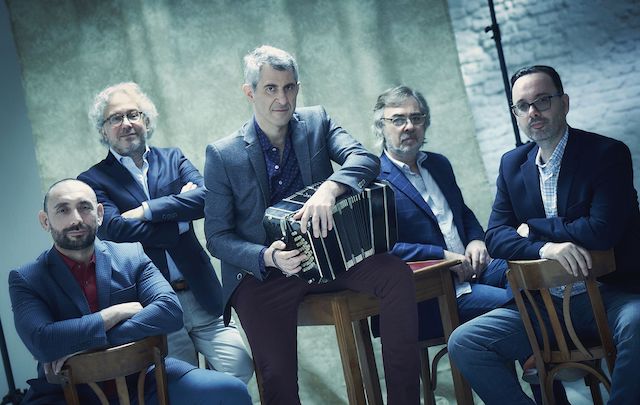Interview: Quinteto Astor Piazzolla on playing in London and why Mick Jagger's a fan | reviews, news & interviews
Interview: Quinteto Astor Piazzolla on playing in London and why Mick Jagger's a fan
Interview: Quinteto Astor Piazzolla on playing in London and why Mick Jagger's a fan
Music Director Julián Vat and pianist Matias Feigin compare notes on Piazzolla

“I still can’t believe that some pseudo-critics continue to accuse me of having murdered tango,” Astor Piazzolla once declared. “They have it backward. They should look at me as the saviour of tango. I performed plastic surgery on it.”
Thirty-three years after his death, and 70 years after he created the “new tango” – fusing the sensual dance form with such disparate elements as New York jazz, Buenos Aires dirt and baroque counterpoint – admirers including Yo-Yo Ma and Daniel Barenboim continue to hail Piazzolla’s transformative influence. Hence the anticipation around the forthcoming performance by the Quinteto Astor Piazzolla at the Barbican Centre, their first in the UK for 25 years. Piazzolla founded his first quintet in 1961, seeing it as the perfect vehicle for expressing revolutionary musical ideas that owed their origins to musicians ranging from Oscar Peterson to Stravinsky. After his death, his widow Laura Escalada Piazzolla had a vision of a new ensemble whose musicians would become the pre-eminent interpreters of his substantial musical legacy.
“I was 15 or 16 and playing in a group that specialised in Piazzolla’s music,” says Julián Vat, Musical Director of the current incarnation of the Quinteto. “We saw Piazzolla driving in his car, and we gave him a cassette of what we were doing and asked if he would listen to it. He phoned us a few days later and invited us to his house, where we all talked for more than six hours and he invited us to play with him.”
I am talking on Zoom to Vat and the Quinteto’s latest recruit, pianist Matias Feigin, shortly before they play in Bilbao for the latest leg of their tour. (The other musicians in the quintet are Pablo Marcelo Mainetti on the bandoneon, Serdar Geldymuradov on the violin, Idelfonso Armando Lazo de la Vega on the guitar, and Martin Nahuel Wainer on the double bass.) Though Vat is 61 and Feigin is some decades younger, it’s clear that for both Piazzolla has proved to be a life-transforming experience. “I didn’t start playing the piano till I was 16, and it was directly because of Piazzolla’s music,” says Feigin. “A classically-trained friend of mine was playing "Adiós Nonino" (one of Piazzolla’s most definitive songs) and I begged him to teach it to me. Everything started there, and he remains the most important musical influence in my life.”
Though his name is now inextricably linked with the reinvention of Buenos Aires’ most iconic dance, Vat and Feigin are well acquainted with the story of how as a young composer Piazzolla wanted to do anything but the tango. “Piazzolla went to Paris [in 1954] to study with Nadia Boulanger,” says Feigin. “She was like a second mother to him, and she knew that he wanted to create serious classical music and compose symphonies – he was a huge fan of Stravinsky. Then she heard him play his tango [Triunfal] and saw how he had made the music his own. So she told him about how Stravinsky was very interested in the bandoneon, and that he [Piazzolla] should pursue this as a composer. That gave him the confidence to return to Argentina and challenge people who thought he should not be interfering with the traditional form of the dance.” Perhaps Piazzolla’s outsider’s vision was due in part to his own mixed cultural heritage. His parents were Italian immigrants to Argentina (his mother from Lucca, his father from Trani), and though he was born in Mar del Plata in Argentina he moved to New York at the age of three. Today the area where he lived – Greenwich Village – is famed for its cultural innovation, but back in the 1920s it was also prone to street violence and clashes between different immigrant communities. “The music of Piazzolla is a direct result of the life he lived,” says Vat. “It was in New York, for instance, that he decided to put the electric guitar into his quintet, which was not remotely traditional for the tango.”
Perhaps Piazzolla’s outsider’s vision was due in part to his own mixed cultural heritage. His parents were Italian immigrants to Argentina (his mother from Lucca, his father from Trani), and though he was born in Mar del Plata in Argentina he moved to New York at the age of three. Today the area where he lived – Greenwich Village – is famed for its cultural innovation, but back in the 1920s it was also prone to street violence and clashes between different immigrant communities. “The music of Piazzolla is a direct result of the life he lived,” says Vat. “It was in New York, for instance, that he decided to put the electric guitar into his quintet, which was not remotely traditional for the tango.”
For devotees of Piazzolla, the enduring appeal of his passionately insurgent, harmonically cosmopolitan version of the tango is in no small part due to the sense it conveys of what one critic described as “the dirt” of life. How does the Quintet ensure it brings out every nuance of what he wrote? “Between us, we bring our different experiences to immerse ourselves in every aspect of the tango’s language,” says Feigin. “Piazzolla’s music is full of strength, but it’s also full of pain.” Piazzolla received both verbal and direct physical attacks for his innovations, and in politically turbulent Argentina there were periods where politicians tried to ban the form outright. “He needed a strong spirit to get over everything he experienced,” Feigin declares.
Piazzolla composed more than 750 pieces during his lifetime. What can audiences at the Barbican expect to hear this July? “For this Oblivion tour we want to show audiences all the possible sides of Piazzolla,” says Vat. “So there will be pieces like Adiós Nonino and Libertango but also works like Verano Porteno [the “Summer” movement from Piazzolla’s response to Vivaldi’s Four Seasons].”
Given Piazzolla’s broad appeal, who are the fans who have most surprised them? “Mick Jagger is a fan – he actually went to the studio to hear his music being recorded,” says Feigin. Vat grins. “Miles Davis, to my mind the most important trumpeter. For so many people Piazzolla’s music is like an addiction. To listen and play is like a kind of drug.”
Is this true for the Quinteto players themselves? “We love the rehearsal process,” says Feigin. “Julián [Vat] really knows us as musicians, so he’s brilliant at asking us to do the best we can.” Vat declares, “Piazzolla didn’t just write music for different instruments, he wrote with a sense of the different musicians who would play these instruments. You cannot play it if you’re not expressing what it means for you.” He warms to his theme. “If you play it the same way every day then you’re doing it wrong – each day your mood changes, your personality shifts – so you’ve also got to ask what it means to you now.” Feigin nods. “This is the spirit that inspires us. It means we leave our personal fingerprint in each piece.”
Explore topics
Share this article
The future of Arts Journalism
You can stop theartsdesk.com closing!
We urgently need financing to survive. Our fundraising drive has thus far raised £49,000 but we need to reach £100,000 or we will be forced to close. Please contribute here: https://gofund.me/c3f6033d
And if you can forward this information to anyone who might assist, we’d be grateful.

Subscribe to theartsdesk.com
Thank you for continuing to read our work on theartsdesk.com. For unlimited access to every article in its entirety, including our archive of more than 15,000 pieces, we're asking for £5 per month or £40 per year. We feel it's a very good deal, and hope you do too.
To take a subscription now simply click here.
And if you're looking for that extra gift for a friend or family member, why not treat them to a theartsdesk.com gift subscription?
more Classical music
 BBC Proms: Alexander’s Feast, Irish Baroque Orchestra, Whelan review - rapturous Handel fills the space
Pure joy, with a touch of introspection, from a great ensemble and three superb soloists
BBC Proms: Alexander’s Feast, Irish Baroque Orchestra, Whelan review - rapturous Handel fills the space
Pure joy, with a touch of introspection, from a great ensemble and three superb soloists
 BBC Proms: Moore, LSO, Bancroft review - the freshness of morning wind and brass
English concert band music...and an outlier
BBC Proms: Moore, LSO, Bancroft review - the freshness of morning wind and brass
English concert band music...and an outlier
 Willis-Sørensen, Ukrainian Freedom Orchestra, Wilson, Cadogan Hall review - romantic resilience
Passion, and polish, from Kyiv's musical warriors
Willis-Sørensen, Ukrainian Freedom Orchestra, Wilson, Cadogan Hall review - romantic resilience
Passion, and polish, from Kyiv's musical warriors
 BBC Proms: The Marriage of Figaro, Glyndebourne Festival review - merriment and menace
Strong Proms transfer for a robust and affecting show
BBC Proms: The Marriage of Figaro, Glyndebourne Festival review - merriment and menace
Strong Proms transfer for a robust and affecting show
 BBC Proms: Faust, Gewandhausorchester Leipzig, Nelsons review - grace, then grandeur
A great fiddler lightens a dense orchestral palette
BBC Proms: Faust, Gewandhausorchester Leipzig, Nelsons review - grace, then grandeur
A great fiddler lightens a dense orchestral palette
 BBC Proms: Jansen, Royal Concertgebouw Orchestra, Mäkelä review - confirming a phenomenon
Second Prom of a great orchestra and chief conductor in waiting never puts a foot wrong
BBC Proms: Jansen, Royal Concertgebouw Orchestra, Mäkelä review - confirming a phenomenon
Second Prom of a great orchestra and chief conductor in waiting never puts a foot wrong
 BBC Proms: Royal Concertgebouw Orchestra, Mäkelä review - defiantly introverted Mahler 5 gives food for thought
Chief Conductor in Waiting has supple, nuanced chemistry with a great orchestra
BBC Proms: Royal Concertgebouw Orchestra, Mäkelä review - defiantly introverted Mahler 5 gives food for thought
Chief Conductor in Waiting has supple, nuanced chemistry with a great orchestra
 Dunedin Consort, Butt / D’Angelo, Muñoz, Edinburgh International Festival 2025 review - tedious Handel, directionless song recital
Ho-hum 'comic' cantata, and a song recital needing more than a beautiful voice
Dunedin Consort, Butt / D’Angelo, Muñoz, Edinburgh International Festival 2025 review - tedious Handel, directionless song recital
Ho-hum 'comic' cantata, and a song recital needing more than a beautiful voice
 Classical CDs: Dungeons, microtones and psychic distress
This year's big anniversary celebrated with a pair of boxes, plus clarinets, pianos and sacred music
Classical CDs: Dungeons, microtones and psychic distress
This year's big anniversary celebrated with a pair of boxes, plus clarinets, pianos and sacred music
 BBC Proms: Liu, Philharmonia, Rouvali review - fine-tuned Tchaikovsky epic
Sounds perfectly finessed in a colourful cornucopia
BBC Proms: Liu, Philharmonia, Rouvali review - fine-tuned Tchaikovsky epic
Sounds perfectly finessed in a colourful cornucopia
 BBC Proms: Suor Angelica, LSO, Pappano review - earthly passion, heavenly grief
A Sister to remember blesses Puccini's convent tragedy
BBC Proms: Suor Angelica, LSO, Pappano review - earthly passion, heavenly grief
A Sister to remember blesses Puccini's convent tragedy
 BBC Proms: A Mass of Life, BBCSO, Elder review - a subtle guide to Delius's Nietzschean masterpiece
Mark Elder held back from blasting the audience with a wall of sound
BBC Proms: A Mass of Life, BBCSO, Elder review - a subtle guide to Delius's Nietzschean masterpiece
Mark Elder held back from blasting the audience with a wall of sound

Add comment